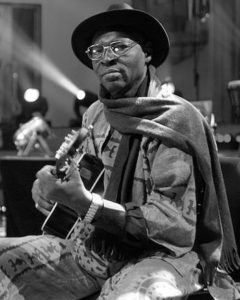
Ali Farka" Touré
*"Ali Farka" Touré was born on this date in 1939. He was a Black African singer, multi-instrumentalist, and one of the African continent's most internationally renowned musicians. Ali Ibrahim "Ali Farka" Touré was born in the village of Kanau, on the banks of the Niger River in the northwestern region of Tombouctou, Mali.
His father died serving in the French Army in 1940. He was his mother's tenth son but the only one to survive past infancy. "The name I was given was Ali Ibrahim, but it's a custom in Africa to give a child a strange nickname if you have had other children who have died," Touré was quoted as saying in a biography on his record label, World Circuit Records.
His nickname, "Farka," chosen by his parents, means "donkey," an animal admired for its tenacity and stubbornness: "Let me make one thing clear. I'm the donkey that nobody climbs on!" Ethnically, he was part Songhai, part Fula. As the first African bluesman to achieve widespread popularity on his home continent, Touré was often known as "the African John Lee Hooker."
Musically, his music's many superpositions of guitars and rhythms were similar to John Lee Hooker's hypnotic blues style. He usually sang in one of several African languages, which established his reputation in the world music community. Touré's first North American concert was in Harrison Hot Springs, British Columbia. 1994's Talking Timbuktu, a collaboration with Ry Cooder, was followed by a hiatus from releases in America and Europe. He reappeared in 1999 with the release of Niafunké, a more traditional album focusing on African rhythms and beats. Touré's songs and tunes have been used in programs, films, and documentaries. His guitar riff on the song "Diaraby" was selected for the Geo-quiz segment of The World PRI-BBC program.
The song "Lasidan" was featured in the award-winning documentary "Sharkwater" by Rob Stewart. In 2002, Touré appeared with Black American blues and reggae performer Corey Harris on an album called Mississippi to Mali (Rounder Records). Toure and Harris also appeared together in the 2003 documentary Feel Like Going Home, which traced the roots of blues back to its genesis in West Africa. In 2004, Touré became mayor of Niafunké, Mali, and spent his money grading the roads, installing sewer canals, and fueling a generator that provided the impoverished town with electricity. In September 2005, Touré released the album In the Heart of the Moon, a collaboration with Toumani Diabaté, for which he received a second Grammy award. Ali Ibrahim "Ali Farka" Touré, whose music blends traditional Malian music and its derivative, North American blues, and is considered a pioneer of African desert blues, died on March 6, 2006.
The Ministry of Culture of Mali announced Touré's death at age 66 in Bamako from bone cancer, which he had been battling for some time. His record label, World Circuit, said that he had recorded several tracks with his son, Vieux Farka Touré, for Vieux's debut album, which was released in late 2006. Touré was ranked 76 on Rolling Stone's list of "The 100 Greatest Guitarists of All Time" and 37 on Spin magazine's "100 Greatest Guitarists of All Time". His last album, Savane, was posthumously released in July 2006. In February 2018, Idrissa Soumaoro's song Bèrèbèrè, featuring Touré, was used in the film Black Panther.